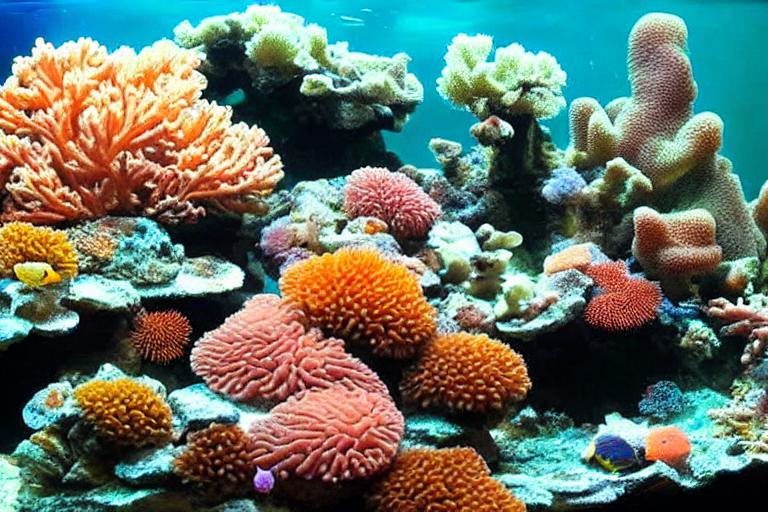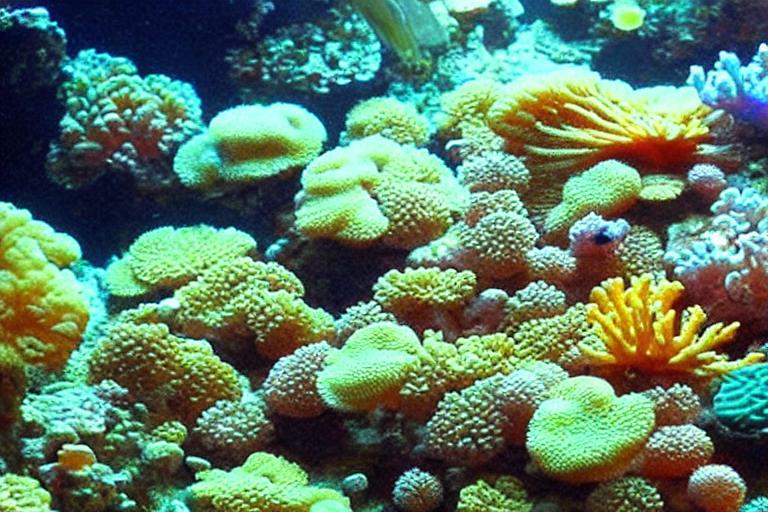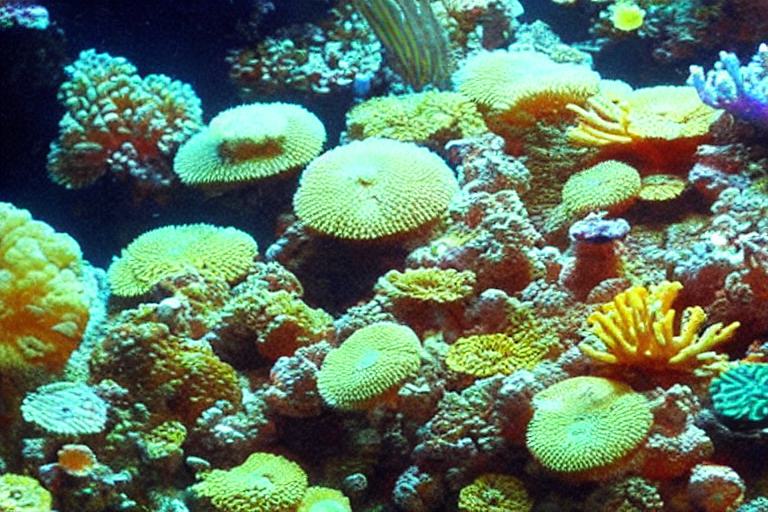Coral reefs are one of the most diverse and beautiful ecosystems on Earth. They are also one of the most fragile. In order to maintain a healthy reef tank, it is important to handle corals with care.
There are a few things to keep in mind when handling corals. First, corals are very sensitive to changes in water quality. When transferring corals to a new tank, be sure to acclimate them slowly to the new water conditions. Second, corals can be easily damaged by rough handling. Be gentle when handling corals, and avoid placing them on sharp or rough surfaces.
With a little care, you can maintain a healthy reef tank that will provide you with years of enjoyment.
What is the Best Way to Handle Corals in Your Reef Tank?
These delicate creatures are easily damaged and their health can quickly decline if they are not properly cared for. When it comes to corals, the best way to handle them is with care and caution.
Second, be gentle when handling them and avoid placing them in areas of high water flow. There are a few things to keep in mind when handling corals. First, always use clean hands and avoid touching them with anything that could damage their delicate tissue.
Third, if you are not sure how to properly care for a coral, it is best to consult with a reef aquarium expert before attempting to do so. By following these simple guidelines, you can help ensure that your corals stay healthy and thrive in your reef tank.

Wear Gloves to Protect Yourself Against Coral
Coral reefs are some of the most beautiful ecosystems in the world. They are also home to a wide variety of marine life, including many species of fish, invertebrates, and other organisms.
They can be easily damaged by careless handling or by contact with harmful chemicals. However, coral reefs are also very delicate ecosystems.
One of the best ways to protect coral reefs is to wear gloves when you are handling them. Gloves will protect your hands from harmful chemicals and from the sharp edges of coral.
If you are not wearing gloves, be very careful when you are handling corals. Make sure that you do not touch them with your bare hands. Also, avoid using any chemicals or cleaners on corals.
By taking these simple precautions, you can help to protect coral reefs and the creatures that live in them.
Be Gentle With Your Coral
Here are a few tips on how to handle coral: Coral is a beautiful and delicate addition to any reef tank, but it’s important to handle it with care.
Use clean hands: Make sure your hands are free of any chemicals or dirt before handling coral. 1.
Support the coral: Gently support the coral with your hand or a soft cloth to avoid damaging it. 2.
3. Don’t handle coral too much: Only handle coral when necessary and be careful not to damage it.
How to Handle Zoanthid Corals and other Poisonous Corals in Your Tank?
Here are a few tips to help you safely handle these beautiful but potentially dangerous creatures. If you’re new to the reef keeping hobby, you may be wondering how to handle zoanthid corals and other poisonous corals in your tank.
This will protect your hands from the coral’s toxins. First, always wear gloves when handling zoanthid corals or any other corals that may be poisonous.
The toxins can cause irritation and even burns if they come into contact with your eyes or mucous membranes. Second, be careful not to touch your face or eyes after handling zoanthid corals.
Third, wash your hands thoroughly with soap and water after handling zoanthid corals or any other poisonous corals.
Following these simple tips will help you safely enjoy these beautiful but potentially dangerous creatures in your reef tank.

What to Know About Zoanthid Corals
They are known for their bright colors and their ability to change their color. Zoanthid corals are a type of coral that is found in many reef tanks. Zoanthid corals are very easy to care for and they are a great addition to any reef tank.
Zoanthid corals are a great addition to any reef tank. Zoanthid corals can be kept in a variety of different tanks. Zoanthid corals are very easy to care for. They do not require any special care or attention. They can be kept in a reef tank, a fish only tank, or a nano tank.
Zoanthid corals are very easy to propagate. Zoanthid corals will grow and multiply very quickly. They can be propagated by breaking off a piece of the coral and placing it in another tank.
Zoanthid corals are a great addition to any reef tank. Zoanthid corals can be kept in a variety of different tanks. Zoanthid corals are very easy to care for. They do not require any special care or attention. They can be kept in a reef tank, a fish only tank, or a nano tank.

When Might a Coral Release Poison?
Coral reefs are some of the most beautiful and biodiverse ecosystems on Earth. They are also very delicate, and can be easily damaged by careless handling.
One of the most common ways that corals are damaged is by being released from their skeletons. When this happens, the coral can release a poison that can kill fish and other animals.
There are a few things that you can do to prevent this from happening. Second, if you do accidentally release a coral, quickly remove it from the water. First, be very careful when handling corals.
Third, make sure that the water in your reef tank is clean and free of pollutants. This will help to reduce the stress on the corals and make them less likely to release their toxins.
How to Safely Handle Your Zoanthid Coral and Other Dangerous Corals?
They are known for their bright colors and beautiful patterns. While they are a beautiful addition to any reef tank, they can be dangerous to handle. Zoanthids are a type of coral that can be found in reef tanks.
Palytoxin is one of the most toxic substances on earth. Zoanthids contain a toxin called palytoxin. It is so toxic that it can kill a human within minutes. If you come in contact with this toxin, you will need to seek medical attention immediately.
Finally, you will need to rinse the coral off with fresh water before putting it back into the tank. This will help to avoid contact with the toxin. This will protect your hands from the toxin. Second, you will need to use a tong or tweezers to pick up the coral. There are a few ways to safely handle your zoanthid coral. First, you will need to wear gloves.
By following these simple steps, you can safely handle your zoanthid coral and avoid contact with the dangerous toxin.
Don’t Expose Your Skin
Corals are a beautiful and delicate addition to any reef tank, but they are also very sensitive to their environment. One of the most important things you can do to care for your corals is to make sure they are not exposed to too much light or too much water movement.
This is a stress response to the coral and can eventually lead to death. Too much water movement can also stress corals and cause them to lose their color. Exposing your corals to too much light can cause them to bleach, which is when they lose their color and become pale.
The best way to protect your corals is to make sure they are not exposed to too much light or water movement. And be sure to give them time to adjust to their new environment before exposing them to full light and water movement. If you must move them, do so slowly and carefully.
Keep Contact to a Minimum
Corals are beautiful, but they can be delicate. In a reef tank, it’s important to keep contact to a minimum to avoid damaging the corals.
Second, be careful when moving around the tank. There are a few ways to minimize contact. Avoid using sharp objects or anything that could potentially damage the coral. First, use a soft toothbrush or your fingers to gently clean the coral.
Only touch it when necessary, and be gentle. By following these simple tips, you can help keep your coral healthy and beautiful. Third, don’t handle the coral too much.
Handle Your Coral Underwater
They are also very delicate, and handling them improperly can damage or kill them. Coral reefs are some of the most beautiful and biodiverse ecosystems on Earth.
If you must touch them, use gloves or a soft cloth. When handling corals underwater, it is important to be gentle and avoid touching them with your bare hands. Also be careful not to damage the coral by bumping it against rocks or other objects.
If you are moving a coral, it is best to do so in a bucket or other container filled with water from your reef tank. Once the coral is in its new location, be sure to acclimate it slowly to the new water conditions. This will help to minimize stress on the coral.
With a little care and attention, you can enjoy your corals for many years to come.
Don’t Let Water Levels Drop
If the water level drops too low, your corals will start to suffer. If you have a reef aquarium, you need to be aware of the water level in your tank.
They will lose moisture and their colors will start to fade. If the water level in your reef tank drops, the corals will start to suffer. Corals need a certain amount of water to stay healthy.
If you notice that the water level in your reef tank is dropping, you need to take action immediately. You can either add more water to the tank or remove some of the corals.
If you add more water to the tank, make sure that the water is the same temperature as the water in the tank. You don’t want to shock the corals.
Don’t remove too many at once. You also need to make sure that the corals you remove are the ones that are suffering the most. If you remove some of the corals, you need to be careful.
Don’t let the water level drop too low or your corals will start to suffer. If you take care of your reef tank, your corals will thrive.
Be Careful When You Are Near Your Tank Water
If you have a coral reef tank, you need to be careful when you are near your tank water. The water in your tank is full of coral and other marine life, and if you are not careful, you could hurt yourself or your tank.
Here are some tips to help you stay safe when you are near your coral reef tank:
-Wear gloves when you are handling coral.
-Be careful when you are moving around your tank.
-Do not put your hands or other body parts in the water.
-Do not touch the coral with your bare hands.
By following these tips, you can help ensure that you and your coral reef tank stay safe and healthy.
Prevent Droplet (Aerosol) Release
This will help to keep the water droplets contained. In order to prevent this, it is important to use a fragging tool that has a guard. When it comes to handling corals in your reef tank, it is important to prevent droplet release. Droplet release can occur when you are fragging, or cutting, corals. When water droplets are released into the air, they can settle on other corals and cause them to become stressed.
Be sure to support them from the bottom so that they do not break. This way, if any water droplets are released, they will fall into the bucket and not onto other corals. Finally, it is important to be careful when handling corals. If you are careful and take these precautions, you can prevent droplet release and keep your reef tank healthy and happy. Another way to prevent droplet release is to frag the corals over a bucket of water.
Final Tips and Recommendations For Handling Corals
When it comes to handling corals in your reef tank, there are a few final tips and recommendations to keep in mind. Secondly, be careful not to damage the coral when removing it from the water, as this can cause it to die. Finally, when placing the coral back into the water, be sure to do so gently so as not to damage the delicate tissue. First and foremost, always use gloves when handling corals, as their sharp edges can easily cut your skin.
By following these simple tips, you can ensure that your corals stay healthy and thrive in your reef tank.
Frequently Asked Questions
1. What are corals and why are they important in a reef tank?
Corals are marine invertebrates that belong to the phylum Cnidaria. They are important in a reef tank because they provide a home and shelter for many marine creatures.
2. How should I handle corals when I first get them?
When you first get your corals, it is important to acclimate them to your reef tank. To do this, float the coral in a bucket of saltwater for about an hour. This will help them get used to the water conditions in your tank.
3. What are some things I should do to care for my corals?
To care for your corals, you should provide them with a good quality saltwater, plenty of light, and a clean tank. You should also avoid touching or moving them too much.
4. What are some common problems with corals?
Some common problems with corals include bleaching, disease, and death. If you notice any of these problems, it is important to seek professional help.
5. What are some things I should avoid doing to my corals?
Some things you should avoid doing to your corals include touching them, moving them too much, and using chemicals in your tank.
Final thoughts
If you’re thinking about adding corals to your reef tank, there are a few things you need to know. First, you’ll need to do some research to find out which corals are compatible with your other tank inhabitants. Once you’ve made your selections, you’ll need to acclimate them to your tank slowly to avoid shocking them. Once they’re settled in, you’ll need to provide them with the proper lighting and water conditions to ensure their health. With a little care, your corals will thrive and add beauty to your reef tank for years to come.
